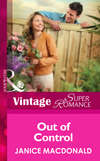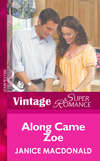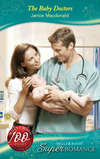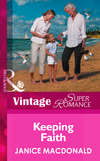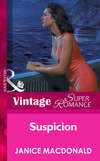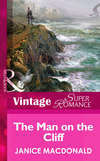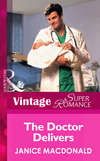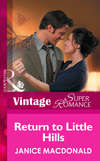Buch lesen: «Out Of Control»
Perhaps he’d built up an image of Daisy
that no actual woman could live up to
The golden-haired child basking in the sunlight of her father’s love had grown into an ethereal goddess…who had an ex-husband and a fourteen-year-old daughter and kept goats. And didn’t return his phone calls. Nick mulled this over for a while, tried to come up with some plausible reasons she might not want to talk to him. He sneezed. Difficult to think while sneezing.
He had lined up some other interviews, which he would do over the next few days. All peripheral to the biography, though. Truman’s relationship with Daisy as it reflected in his art was the central theme of the work; Truman was dead, so no one else really mattered but Daisy.
Dear Reader,
I sometimes think that if, in order to become a parent, we had to apply for the job, the world’s population would shrink considerably. I was very young when I had my children and, looking back, the only thing I knew at the time was that I wanted to be a mother. Many years later, with two beautiful and much-loved adult children—and a granddaughter—I wouldn’t have changed anything. But I still wish I’d been more prepared for the awesome responsibilities ahead.
In Out of Control, Daisy and Nick both struggle with the question of what it takes to be a good parent. Nick loves his daughter but is painfully aware of his shortcomings. Daisy, abandoned by her mother and raised by a decidedly offbeat father, wants her own daughter to feel the emotional security she herself never experienced as a child.
These days as I find myself caring for my ninety-year-old mother, I’m reminded of how cyclical the life process is. I hold my mother’s hand as we journey out, much as she once held my hand and as I held the hands of my own children. I haven’t always been the perfect daughter (just ask my mum!), just as I’m not always the perfect mother (just ask my kids!), so perhaps it’s just as well I never had to apply for the roles. But despite the mistakes I’ve made, the things I wish I’d done differently, I’m immensely grateful that I was given the opportunity. A life filled with love, compassion and a liberal sprinkling of humor is an invaluable ingredient for making it through the rough times.
I hope you enjoy Out of Control. I really do like hearing from you and do my best to answer every letter or e-mail. You can reach me at www.janicemacdonald.com or at PMB 101, 136 E. 8th Street, Port Angeles, WA 98362.
All the best,
Janice
Out of Control
Janice Macdonald

ABOUT THE AUTHOR
Janice Macdonald is an author and freelance writer who divides her time between San Diego and Port Angeles, Washington, where she lives in a cabin on the edge of the Olympic National Forest and watches deer graze when she should be writing! She recently discovered the joys of Bach and now listens to his music constantly.
CONTENTS
PROLOGUE
CHAPTER ONE
CHAPTER TWO
CHAPTER THREE
CHAPTER FOUR
CHAPTER FIVE
CHAPTER SIX
CHAPTER SEVEN
CHAPTER EIGHT
CHAPTER NINE
CHAPTER TEN
CHAPTER ELEVEN
CHAPTER TWELVE
CHAPTER THIRTEEN
CHAPTER FOURTEEN
CHAPTER FIFTEEN
CHAPTER SIXTEEN
CHAPTER SEVENTEEN
CHAPTER EIGHTEEN
CHAPTER NINETEEN
CHAPTER TWENTY
CHAPTER TWENTY-ONE
PROLOGUE
October 6, 2003
Ms. Daisy Fowler
Chaparral Hills
Laguna Beach, California,
U.S.A.
Dear Ms. Fowler:
I am writing to let you know that I have been contracted to write a biography of your late father, Mr. Frank Joseph Truman.
I first became interested in your father’s work after seeing a painting in his Innocence series in a London art gallery. The portrait of a young girl on a sunlit bluff was exquisite; I recall standing in the wet chill of a November evening but feeling almost transported. For a moment, I’d felt the ocean wind that tangled the girl’s hair, tasted the tang of salt on my own lips. My captivation was complete when I learned from the gallery owner that this was a painting of the artist’s only daughter.
On a very personal note, having a daughter who is probably a year or so younger than you were when Mr. Truman painted you, I experienced what I can only describe as a connection to and a profound admiration for him as a father. I couldn’t help thinking that his love must have contributed to the magical beauty of the work.
I am the author of three previous biographies, most recently, Antonio Bongiovanni, the Italian Tenor, scheduled for publication later this year. I am also a frequent contributor to the London Times.
I hope you will agree that a well-researched, sympathetic biography of your father would be a tribute to his memory, and, to that end, I would like to schedule a time that we can meet to discuss this project. I will contact you when I arrive in Laguna the first of next month. I look forward to meeting you. For your information, I have also contacted Mr. Truman’s widow, Amalia née Rodrigues and his brother, Dr. Martin Truman.
Best Regards,
Nicholas Wynne
CHAPTER ONE
TRYING TO BE a good father was rather like trying to sing in key, Nick thought as he watched his twelve-year-old daughter pick suspiciously at her tandoori chicken. You could be close enough that almost anyone might recognize the tune, but no one was ever going to mistake you for Frank Sinatra. And, inevitably, you managed to strike a note that simply fell flat.
“I thought you’d like Indian food,” Nick said, trying not to sound reproachful. Their table was next to the window. Outside, the wet street reflected a string of red taillights and the neon sign from the cinema marquee. A waiter in black trousers and a white cotton jacket hovered nearby.
Bella set down her fork. She wore a yellow jumper that she’d coaxed Nick into buying on their last outing, and her hair was pulled back into a tight plait that came halfway down her back. “Did you ask me first?”
“Well, no, but—”
“Because if you had, I could have told you that Mummy already tried to make me like it, and I couldn’t stand it then and I still don’t like it.”
“Perhaps you should have said something before I ordered,” Nick suggested. “Even as we walked into the restaurant, perhaps.” Disappointment and a sense of failure made him feel churlish.
Bella seemed unaffected by his mood, her eyes—the same light green as her mother’s—conveyed her disdain. Set against the olive complexion she’d inherited from him, the impact was striking. He’d look at her and envy anyone with even a modicum of artistic talent. In his head, he could wield a paintbrush in a way that captured the subtle nuance of expression, the play of light across her face. In reality, he couldn’t even take a decent snapshot.
“But you enjoyed the art exhibit?” he asked. Please tell me I’m doing something right. Last week he’d read an article about a support group for divorced fathers. They met Monday nights in a church hall about a ten-minute walk from his North London flat. He might have made it a point to stop in, but he was leaving town—leaving the country, in fact. By the next meeting, he’d be in California, gathering material for the Truman biography that he was now under contract to write. The exhibit he’d taken his daughter to see had been a Truman retrospective.
“God forbid you’d waste a Saturday afternoon with your daughter doing something nonproductive,” Bella’s mother, Avril, had remarked.
He banished his ex-wife from his thoughts. “The girl in the picture was the same age as you when—”
“Her father painted it,” Bella filled in. “And her name was Daisy.”
“Sorry,” Nick said. “I forgot I’d already told you.”
“About a hundred and fifty times.”
“I’ve told you about two hundred and fifty times not to exaggerate,” Nick said, straight-faced. “And her name is Daisy.”
Bella looked at him.
“She’s still alive and kicking,” he said. “So her name is Daisy.”
“Well, it’s a very old-fashioned name,” Bella said, as though that justified using the past tense. “It’s like a name from a fairy story…. Or of somebody’s dotty old auntie.”
“Actually, she’s probably just a year or two younger than me.” He drank some water, and set his glass down. “Which I suppose in your books makes her an old crone.”
The glimmer of a smile broke across his daughter’s face. He watched her fight it. He’d angered her and, as far as she was concerned, done nothing to warrant her forgiveness. She desperately wanted to go to Laguna with him even though he and her mother, for once in agreement, had explained all the reasons why it wasn’t feasible. Nick suspected that she still thought he’d ultimately relent.
Having given up any pretense of eating her chicken, she was now watching him intently as if for a clue to his final decision.
“Stop it,” he said. “I know exactly what you’re doing and it’s not working.”
Her eyes widened. “What am I doing?”
“You’re trying to make me feel guilty.”
“No one can make you feel guilty.” Her voice sounded eerily like her mother’s. “Only you can do that.”
He regarded her with something close to wonder. How could a child almost a quarter his age sound so much like the parent? Still, she had a point. Of all the emotions he felt as a father, guilt was uppermost—he constantly berated himself for not spending enough time with her, for putting his work first, for not always being attentive when he was with her. Ironic, considering he’d been taken with Truman’s portrait as much for what it suggested about the man as a father as for his skills as an artist.
For a while he’d been almost obsessed with Truman, attributing to the artist all the fatherly qualities he himself seemed to lack. And then one of the ex-wives, now dead, had written a memoir portraying Truman as a bitter, angst-ridden man who practiced the piano incessantly in case his talent as a visual artist should abandon him, who obsessively hoarded everything from toilet paper rolls and fingernail clippings to cans of food. A man who was apparently incapable of conceding he was wrong about anything.
Truman’s second wife, Amalia, a one-time Portuguese fado singer, had offered a completely different perspective when Nick had reached her by phone. “Franky,” as she called Truman, had all but walked on water. Amalia had appeared on the scene when Daisy was about ten; Nick had found a picture of the three of them in the archives of the weekly Laguna Beach newspaper over a wedding announcement.
The identity of Daisy’s mother was still something of a mystery but one he expected to resolve once he got to the States.
“Daddy?” Bella treated him to her most soulful look. “Please?”
“Bella, I am going to Laguna to work,” Nick said. “I’ll be out interviewing people and, when I’m not doing that, I’ll be writing. There would be nothing for you to do.”
“I could watch television and go to the beach.”
“And the little matter of school?”
“I’ll catch up when I come back. It’s only six weeks.”
“We’ve gone over this so—”
“I hate this chicken.” She glared at him. “I hate this place.”
In a flash, she was up out of the booth, dragging the edge of the cloth in her haste to leave. Silverware and a water glass clattered to the floor. Nick quickly made apologies and paid the bill before going after her.
“Well, Nick, I’m sorry for stating the obvious—” his ex-wife said when he dropped a sullen and uncommunicative Bella off later that night “—but it was your choice to write about an artist who lived halfway across the world. I don’t suppose it occurred to you there might be subjects here in England…just a little closer to home?”
ON HIS FIRST DAY in Laguna, even before he’d unpacked his files and computer, he walked into the village and spent a great deal of money on two cotton dresses, a skirt and three shirts that the shop assistant said would be perfect for a twelve-year-old girl.
IN THE SMALL WAITING ROOM off the emergency department, Daisy Fowler tried to slow her breathing.
Amalia would be fine.
Daisy breathed deeply, sending healing thoughts to Amalia, who had just been wheeled off on a gurney, her head split open and her face the color of parchment.
Slow, deep breaths.
Amalia had called her last week, giddy with excitement. Someone was going to write Frank’s life story. Daisy had also received a letter from the biographer. Same letter, very different reactions. They’d had a huge fight, and Amalia hadn’t spoken to her since.
An hour ago, she’d got a call from the hospital that Amalia had fallen from her dune buggy and was in the emergency room.
There had also been a fight the night the house burned down with her father in it. “I hate you,” she’d screamed.
“Lighten up, Daisy,” her friend Kit was always telling her. “You’re too hard on yourself. You’re not responsible for other people’s behaviors.”
Like maybe her sixty-five-year old stepmother driving a dune buggy. Inebriated.
Deep breaths. Daisy closed her eyes and tried to meditate. She was learning the technique from a book she’d picked up last week, How to Forgive. The author, Baba Rama Das, pictured on the front cover, had dark, mesmerizing eyes that seemed to follow her around the room. No matter where she set the book, she’d somehow catch a glimpse of him. Yesterday, she’d felt guilty for watching Dr. Phil instead of meditating about forgiveness.
Forgiveness creates peace of mind, Baba said. It also helps heal emotional wounds and leads to new, more gratifying relationships. Hey, sign me up, she’d thought.
Suddenly, she felt frantic to talk to her daughter. Emmy had stomped off to catch the school bus that morning, mad over something or other. Her usual mood these days. Daisy couldn’t recall the last time she and Emmy had actually talked. Really talked. A heart-to-heart kind of talk like the kind Kit regularly had with her daughter. Lately, it seemed all she and Emmy did was fight.
Still, just hearing Emmy’s voice would make her feel better, more in control. She reached into her purse for the cell phone. As she punched in the number, she noticed the sign on the wall. A picture of a cell phone with a red line drawn through it. She ignored it. The answering machine came on.
“Hi sweetie,” she said. “I’m at the hospital with Amalia. She had some kind of accident with the dune buggy—”
“Mom?” Emmy had picked up the phone. “What’s wrong? Is she okay?”
“She’s in surgery right now. She was driving up the dirt road to the highway, God knows why. I’ve told her enough times—”
“Just tell me.”
“Well, she hit her head, which isn’t good, but she’s going to be okay. She will be okay. She’ll be fine.”
“Tell her I love her,” Emmy said.
“I will.” Daisy’s nose stung with tears. “I love you too, sweetie.”
Emmy had already disconnected. The cell phone rang before she had time to put it away.
“Hello, is this Daisy Fowler?”
“Yes.”
“Nick Wynne. We spoke on the phone a few weeks ago…about the biography I’m writing on your father.”
For a moment Daisy couldn’t think of what to say. Go away came to mind. “This is a bad time,” she finally managed. “I really can’t talk right now.” It was the same tone of voice she used on telephone solicitors. Rude and impatient, letting them know they’d intruded on her privacy. “
“I’d intended to call you in a day or so,” Nick said. “But I was supposed to meet your stepmother at noon, and it’s now half past one and I wondered if you might know—”
“She’s in the emergency room,” Daisy said. “Which is why I can’t talk.”
“Oh, no.” A pause. “Not serious, I hope?”
“I’m waiting to find out.”
“Well, look, I don’t want to pester you when you obviously have other things on your mind, but I’ll be here in Laguna for the next few weeks so perhaps you could give me a ring when—”
“Sure,” Daisy said.
“Shall I give you my number, or—”
“Go ahead.” Whatever else Nicholas Wynne said, she didn’t hear. The doctor had just walked into the room.
LATER THAT NIGHT, after she’d learned that Amalia’s injuries weren’t serious, after she’d cooked dinner and done the dishes, helped Emmy with her homework and tried to meditate for five minutes—it was all she could manage without her thoughts going all over the place—she started feeling bad about being rude to Nicholas Wynne.
Maybe she would call tomorrow and explain that she’d just been distracted because of Amalia and, even though she wasn’t that thrilled about the whole biography thing, she’d do her best to work with him.
She walked to the window and looked out at the grove of eucalyptus and beyond the trees to the clearing where she’d built the goat pen. One of the goats was trying to butt its way out, and she made a mental note to fortify the fence. The wind had picked up since the sun had gone down. Scattered about the property between tree trunks, she could see the roofs and wooden porches of the other cabins. At night, the lights from their windows twinkled like stars.
Her father had built the compound himself nearly fifty years ago, hand crafted cabins embellished with sculpture, stained glass, mosaics and wrought iron. Her father had been the consummate collector.
Her own cabin, the largest, had three bedrooms—one of which she thought of privately as her studio—and a wraparound porch. Winding gravel paths linked one structure to another. The occupants were all friends—like Kit, artists. Daisy found the sense of unity comforting. Martin, her uncle, saw it as another example of what he called her “naïve” generosity. “If they can’t sell their stuff, they obviously don’t have talent. They should take full-time jobs and support themselves instead of relying on you,” he’d point out ad nauseam.
Building developers were always trying to get her to sell the property, but Daisy preferred to believe that her father would have liked it that she was helping a bunch of struggling artists. Collectively, they referred to themselves as the Raggle Taggle Gypsies. She’d come up with the name from an old folk song about a noble woman who ran off with the gypsies. She thought it more romantic than, say, Undisciplined Artists Who Lived Mostly Rent Free.
Unlike Daisy, none of the other cabin dwellers had inherited substantial fortunes.
“You imbecile,” her father had shouted the night he died. “You stupid, stupid, girl. You utter fool,” he’d thundered, pointing an imperious finger at the door. “Out of this house. I don’t want to see your face again.”
“Oh, I had the most perfect childhood imaginable,” she pictured herself telling Nicholas Wynne. “Idyllic really. Yes, exactly. Just like the picture.”
CHAPTER TWO
NICK HAD ARRANGED to meet Truman’s brother Martin at the Hotel Laguna for a late breakfast. Still slightly jet-lagged, he had awakened at three, then stayed awake listening to the wind howling down the canyons. Now, five minutes early for his appointment, he strolled through the tiled lobby in the footsteps of Bette Davis, Judy Garland and Charlie Chaplin.
Laguna Beach, heart of the California Riviera, and a playground for the fabulously wealthy, a mix of artists’ colony and upscale resort, of rustic beach cottages and gated mansions. The water was blue, the sand was the color of milky coffee and he couldn’t look at either without thinking guiltily of Bella back in London. He would see how the work went and perhaps have her over for the last couple of weeks.
He wandered into the art-deco bar. The Grand Old Lady, as the pink stucco landmark on Pacific Coast Highway was affectionately known, had reportedly been the favorite trysting spot of Bogart and Bacall. Truman’s wife Amalia had told him that the artist had often enjoyed an evening cocktail on the balcony while he watched the sunset. He would send flowers to the hospital today, he decided.
“Nicholas.”
Nick turned to see a tall and imposing man with thinning gray-black hair dressed somewhat formally for hypercasual Laguna in tan trousers and a cream sports coat. He looked like his brother, or at least the pictures Nick had seen of Truman.
After exchanging pleasantries, they moved out to the balcony and sat at one of the white wrought-iron tables. Nick craned his neck to look around. In one direction, the curve of blue and silver shoreline, in the other dark green hills tiered with terra-cotta roofs. Purple bougainvillea sprawled down the walls, red geraniums spilled from several giant urns. Realizing that Martin was watching him, he grinned self-consciously.
“Just playing awestruck tourist,” he said.
“I’d like to think I never take it for granted,” Martin said, “but the truth is I do. After a while, you stop seeing all this.” He waved an arm to encompass the postcard-perfect scenery. “We get caught up in our lives. Have you seen much yet?”
“I just arrived two days ago, but I’d like to incorporate a bit of sightseeing.” A waitress in blue jeans, tight as a second skin, and a tourniquet of yellow spandex set down water and menus, treating him to the sight of full breasts, tanned and freckled like eggs. “I’ll probably wait until my daughter gets here.” He drank some water. “She’s incensed about having to stay in London while I’m gallivanting, as she sees it, in California.”
Martin smiled. “How old is your daughter?”
“Twelve.” When Martin said nothing, Nick rushed to fill the conversational void. “Child of divorced parents. Ever-present guilt.” He remembered that Martin was a psychiatrist and Nick decided the silence was intended to draw him out. A tactic he often used himself. He decided not to be drawn. “And you? Children?”
“Unfortunately, no. My wife, Johanna, is a pediatric psychiatrist and we were so involved in building our practices, the time never seemed right. And then it was too late.”
He took a pair of silver-rimmed glasses from the pocket of his blazer, put them on and studied the menu. Nick picked up his own menu but managed a few surreptitious glances across the table. Martin had a soft, full mouth, red-lipped and almost womanish. He’d removed the blazer, carefully draping it over the back of an empty chair. The cuffs of his off-white shirt were rolled just above the wrists, both at precisely the same length. Nick imagined him comparing them in the mirror, lining them up just so, using a tape measure perhaps. If he shared any of his late brother’s artistic temperament, it wasn’t evident.
The waitress arrived. Nick ordered huevos rancheros, described on the menu as fried eggs, chopped tomatoes, chili peppers, Manchego cheese and tortillas. It sounded exotic enough that he’d probably regret it later. Martin ordered half a grapefruit and a slice of whole wheat toast. Dry. They both had coffee, Martin’s decaf.
Martin cleared his throat. “Regarding my brother.” He aligned his knife and fork with the pale yellow linen napkin, studied the effect for a moment, then looked up, fixing his sight on a spot somewhere beyond Nick’s right shoulder. “I should preface this discussion by saying that my brother had detractors. I assume you’ve read the…” He pursed his full lips as he appeared to seek the right word. “The piece of spiteful, slanderous garbage that his first wife threw together in an attempt to cash in on his name.”
Nick nodded. This was the woman who’d written that Truman was given to raiding the bins behind supermarkets for edible discards, this after he’d amassed considerable wealth with his art.
“You’re suggesting that what she wrote was untrue?”
“I’m advising you that if, as you stated in your letter, you intend to write a sympathetic, well-researched and objective biography of my brother you’ll forget every word you read in that book.”
“What was her motivation for writing such a book, do you suppose?”
“A woman scorned. Frank, finally seeing the light, divorced her and—since she’d already been through half his money—saw no reason to provide for her any further.”
The waitress brought the food. Nick eyed his tray-sized platter. The huevos rancheros came with a small mountain of rice, bits of broken tortillas and something pale brown topped with cheese. He investigated it with his fork and glanced up at the waitress.
“Refried beans.” She smiled. “Enjoy.”
“You’d mentioned detractors,” Nick said. “Plural.”
Martin was working on his grapefruit, running a table knife around the rim of the fruit with the meticulous attention of a brain surgeon. “Amalia, his widow, while not precisely a detractor, isn’t always completely truthful.”
Nick looked at him.
“She has a drinking problem.” He set the knife down. “Do you know about her recent accident?”
“Yes. We were supposed to meet for lunch and when she didn’t arrive, I called Daisy. How is she?”
“Physically? Improving, I gather from my niece. Mentally?” He shrugged. “It all depends. She’s a very flamboyant, emotional woman. Given to embroidering the truth. When Frank met her she was singing in a café in Portugal. I’d take what she says with a grain of salt.”
Nick grinned. “Sorry,” he said when Martin gave him a puzzled look. “Usually when I write biographies, I have access to the subject’s papers. Letters, diaries, that sort of thing. In your brother’s case, everything was lost in the fire. Since he was somewhat reclusive, the number of people available to me to interview is somewhat limited. His first wife’s book is apparently a lie and now you’re saying his widow can’t entirely be trusted. It just struck me suddenly as funny. Although I should probably be gnashing my teeth.”
Martin smiled faintly. “Yes, well, Daisy will be an invaluable resource. She was closer to Frank than anyone, although Amalia would have you believe that only she held the key to Frank’s innermost thoughts.”
“How is your relationship with Daisy?” Nick asked. “Good?”
Martin patted the napkin against his lips. “Excellent.” He shrugged. “Her naïveté troubles me, but for the most part we get along.”
“Frank became a father quite late in life,” Nick said, moving on.
“He did. Like myself, he was focused on his profession.”
“And Daisy’s mother?”
“Daisy was adopted.” Martin glanced around for the waitress. “More coffee would be most welcome,” he muttered.
“Adopted between Frank’s first and second marriages?”
Martin frowned. His thoughts seemed suddenly elsewhere. “I’m sorry,” he said after a moment. “You were asking?”
“Just trying to understand the chronology. He was divorced from wife number one—”
“And then he traveled to Portugal, where he met Amalia and brought her back to Casa Athena, his home. She was here for a number of years, supported by my brother, before returning to Portugal. In the interim, my brother adopted Daisy. Just after Daisy’s tenth birthday, Amalia came back to Laguna and she and Frank were married. She was with him until he died.”
Nick had stopped eating as he listened to the recitation. He watched now as Martin cut a slice of toast into precise triangles, full lower lip jutting. “Were you and Frank at all alike?” he asked.
“Very much so,” Martin said.
Nick tried to keep the surprise from his face. “In what ways, for example?”
“Honesty, integrity. A passion for our respective professions that precludes almost everything else.”
“But Frank had a daughter,” Nick said. “I know in my case, my former wife constantly complains that I put my work first. Was it difficult for Daisy, do you think? Being the daughter of a respected and prolific artist?”
Martin, having eaten his toast and grapefruit, folded his napkin and placed it on his plate. “I know nothing of your personal situation, of course, but Frank had a unique ability. I’d said his passion for art precluded almost everything else. The almost being Daisy. My brother had the unique ability to…how shall I put it, integrate the love he had for his daughter into his art.”
Nick thought of seeing Truman’s artwork for the first time. The rainy, London street outside, the sunlit cliff and the smiling girl on the canvas inside. “Yes. I saw that in his work,” he said truthfully. “Which is why I’m writing this biography.”
“TODAY’S LESSON in self-improvement, in case you’re interested, is about not feeling resentful and put-upon,” Daisy told Kit. “But Toby’s doing his usual shtick, Amalia’s calling every five minutes from the hospital, Emmy’s being impossible and I’m supposed to drop everything and sit patiently while some guy I don’t know from Adam asks me to reminisce about my father.”
“You sound resentful and put-upon,” Kit said.
“I guess I need to work a little harder, huh?”
They were drinking guava-flavored iced tea and watching for the school bus as it lumbered its way up Laguna Canyon Road to drop off their daughters. Daisy was wearing a shirt that read, I Live In My Own World, But It’s Okay, They Know Me Here. She and Kit were both wearing flip-flops. Daisy’s were a pink-and-white candy-striped rubber version with a pink daisy on the toepiece; Kit’s were lime-green translucent plastic. They’d picked up four pairs—a pair each for them and for the girls—the day before at the end-of-season sale at the Village Drug Store.
Daisy looked at their feet side by side on the wooden deck rail. Kit’s were a dark olive color, her toenails painted deep burgundy, which, in the dappled shade, looked almost black. Her own feet were freckled, her toes unpainted, although Emmy was always offering to paint them, or encouraging her to get a pedicure. Emmy, to her perpetual disgust, had inherited Daisy’s tendency to burn rather than turn lusciously caramel like every other kid in Laguna, or golden-brown like her father.
Der kostenlose Auszug ist beendet.
